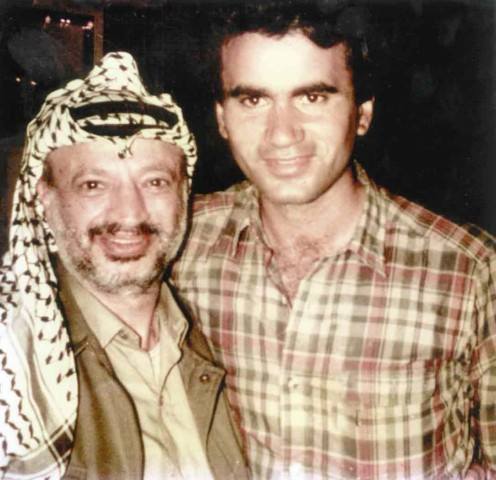Recalling an interview with Yasser Arafat on the anniversary of his death

With Yasser Arafat in 1982.
By Habib Toumi
MANAMA: It was around midnight when we got the much-awaited call announcing that the “Chairman” would meet us within a couple of hours at an hotel transformed into the temporary headquarters of the Palestinian authority in Tunisia.
We immediately leapt into action, rushed our cameras, stands and microphones and headed towards Borj Cedria, a coastal town some 25 kilometers away from the capital Tunis.
Our driver was slicing the darkness enveloping us on the cold October night as Bob Keller, the American Broadcasting Corporation (ABC) chief reporter was reviewing with me and another colleague the situation.
Bob had been fighting for the interview, one of the first by Yasser Arafat since he left Beirut and shortly after the news of the Sabra and Chatilla massacre in the Lebanese capital. On July 16-18, hundreds of Palestinian men, women and children were massacred at the two refugee camps after the Palestinians left the city.
Thanks to his connections that he had cultivated with the Palestinians in Beirut where he was based as the US network ABC News correspondent, Bob was able to secure the interview.
We arrived at the Salwa Hotel and following a tedious check-up with the local authorities guarding the premises and the Palestinians, calm but edgy, we were allowed in a waiting room.
We whiled away the time with short conversations with Palestinian officials who, up to that moment, were mainly media figures to me, watching them on TV or reading about them.
We were anxious the interview would be called off, and we insisted the officials make sure we meet with Arafat even if it were for fleeting minutes.
At around 3 a.m., we were told that the Chairman would meet us and we followed our “guide” into a large room.
As the cameras were set up, Yasser Arafat entered the room that he used as his office.
He knew Bob and the two men shook hands warmly. I moved forward and greeted the man whose every move and every word had been dominating the news worldwide during and after the siege of Beirut.
He flashed into the smile that I had often seen on television and shook my hand. We exchanged greetings in Arabic.
Bob had told me that Arafat had worked on his English to be able to communicate his thoughts without the need for an interpreter after he watched how Egyptian President Anwar Sadat worked on enhancing his English linguistic skills to address the US officials and people directly and with greater confidence.
The interview went smoothly with Arafat answering the questions that covered a wide spectrum of topics – Beirut, Sabra and Chatilla, Philip Habib (the authority on Southeast Asia and peace negotiator in the Middle East), the future of the Palestinians, the next moves by the Palestinian Liberation Organization …
He felt he had a major international cause that needed urgent attention from the global community. He obviously had messages to convey and he focused on making the sure they are well articulated.
The interview lasted around 25 minutes, and we were all satisfied with it. Then, we talked for about five minutes off camera before Arafat had to move on. He headed to the door to welcome his guest and hold a round of talks. It was close to 4 am.
Yasser Arafat, passionately admired and ardently loathed at the same time, died on November 11, 2004. He was 75.





















































